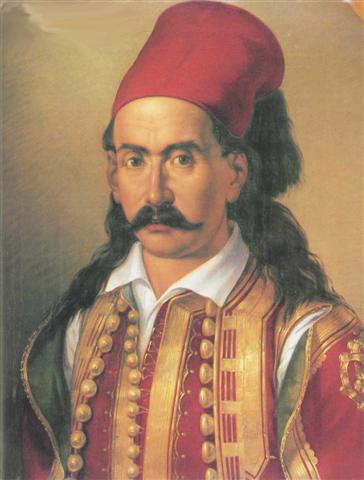Markos Botsaris: Difference between revisions - Wikipedia
 Article Images
Article Images
Content deleted Content added
Khirurg 31,480 edits |
|||
Line 34: ==Early life== Botsaris was born into one of the leading clans of the [[Albanians|Albanian]]<ref name="LitList"> Botsaris was born into one of the leading clans of the [[Souliotes]], in the region of [[Souli]], [[Epirus]].<ref name=Fleming>Katherine Elizabeth Fleming. [https://books.google.com/books?id=zZqbA6Jk0uUC&dq ''The Muslim Bonaparte: diplomacy and orientalism in Ali Pasha's Greece'']. Princeton University Press, 1999. {{ISBN|978-0-691-00194-4}}, p. 99"The Souliotes, a Greek-speaking tribe of Albanian origin... Ali had tried off and over..."</ref> He was the second son of captain [[Kitsos Botsaris]], who was murdered in [[Arta, Greece|Arta]] in 1813 under the orders of [[Ali Pasha of Ioannina|Ali Pasha]].<ref>Nikos Giannopoulos, Stratiotic History, part 138, 2008, page 11, Publications ''Periskopio''</ref> The Botsaris clan came from the village of Dragani (today Ambelia), near [[Paramythia]].▼ * Balázs Trencsényi, Michal Kopecek: ''Discourses of Collective Identity in Central and Southeast Europe (1770–1945): The Formation of National Movements''. Central European University Press, 2006, {{ISBN|963-7326-60-X}}, S. 173. “The Souliotes were Albanian by origin and Orthodox by faith”. * Giannēs Koliopoulos, John S. Koliopoulos, Thanos Veremēs: ''Greece: The Modern Sequel: from 1831 to the Present''. 2. Edition. C. Hurst & Co., 2004, {{ISBN|1-85065-462-X}}, p. 233: "Albanian -speaking Suliots and Hydriots, Vlach speaking Thessalians and Epirots, and Slav-speaking Macedonians had fought in insurgent Greece along with the other Greeks, and no one at the time had thought any of these non-Greek speakers less Greek than the Greek-speakers.... of himself as less of a Greek for speaking little or nothing of the language, notwithstanding the ongoing debate on Greekness and Greek identity." * [[Eric Hobsbawm]]: ''Nations and Nationalism Since 1780: Programme, Myth, Reality''. 2. Edition. Cambridge University Press, 1992, {{ISBN|0-521-43961-2}}, S. 65 * NGL Hammond: ''Epirus: the Geography, the Ancient Remains, the History and Topography of Epirus and Adjacent Areas''. Clarendon P., 1967, S. 31 * Richard Clogg: ''[https://books.google.com/books?id=231XALxmFFsC&pg=PA178&dq=Richard+Clogg+souliotes&lr= Minorities in Greece: Aspects of a Plural Society]''. Hurst, Oxford 2002, S. 178. [Footnote] “The Souliotes were a warlike Albanian Christian community, which resisted Ali Pasha in Epirus in the years immediately preceding the outbreak the Greek War of Independence in 1821.” * Miranda Vickers: ''The Albanians: A Modern History''. I.B. Tauris, 1999, {{ISBN|1-86064-541-0}}, S. 20. “The Suliots, then numbering around 12,000, were Christian Albanians inhabiting a small independent community somewhat akin to that of the Catholic Mirdite tribe to the north”. * Nicholas Pappas: ''Greeks in Russian Military Service in the Late 18th and Early 19th Centuries''. Institute for Balkan Studies. Monograph Series, No. 219, Thessaloniki 1991, {{ISSN|0073-862X}}. * Katherine Elizabeth Fleming: [https://books.google.com/books?id=zZqbA6Jk0uUC&printsec=frontcover ''The Muslim Bonaparte: Diplomacy and Orientalism in Ali Pasha's Greece''.] Princeton University Press, 1999, {{ISBN|0-691-00194-4}}, S. 59. “The history of the Orthodox Albanian peoples of the mountain stronghold of Souli provides an example of such an overlap.” * André Gerolymatos: ''The Balkan Wars: Conquest, Revolution, and Retribution from the Ottoman Era to the Twentieth Century and Beyond''. Basic Books, 2002, {{ISBN|0-465-02732-6}}, S. 141. “The Suliot dance of death is an integral image of the Greek revolution and it has been seared into the consciousness of Greek schoolchildren for generations. Many youngsters pay homage to the memory of these Orthodox Albanians each year by recreating the event in their elementary school pageants.” * Henry Clifford Darby: ''Greece''. Great Britain Naval Intelligence Division. University Press, 1944. “… who belong to the Cham branch of south Albanian Tosks (see volume I, pp. 363–5). In the mid-eighteenth century these people (the Souliotes) were a semi-autonomous community …” * Arthur Foss (1978). ''Epirus''. Faber. pp. 160–161. “The Souliots were a tribe or clan of Christian Albanians who settled among these spectacular but inhospitable mountains during the fourteenth or fifteenth century…. The Souliots, like other Albanians, were great dandies. They wore red skull caps, fleecy capotes thrown carelessly over their shoulders, embroidered jackets, scarlet buskins, slippers with pointed toes and white kilts.” ▲ ==French Army and repatriation to Souli== | |||